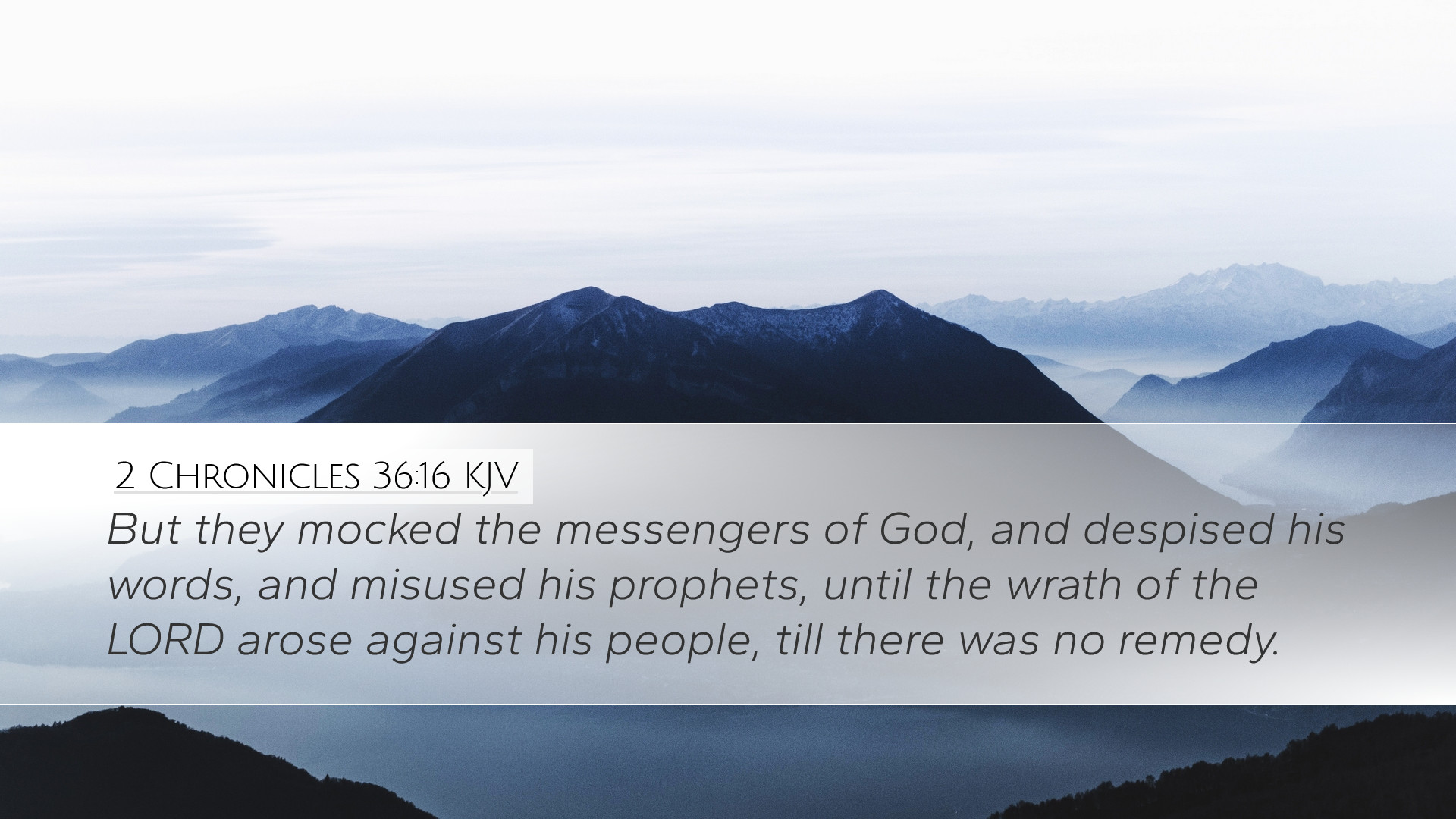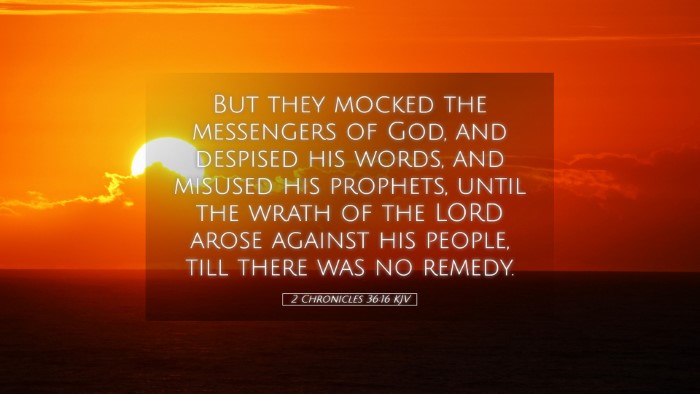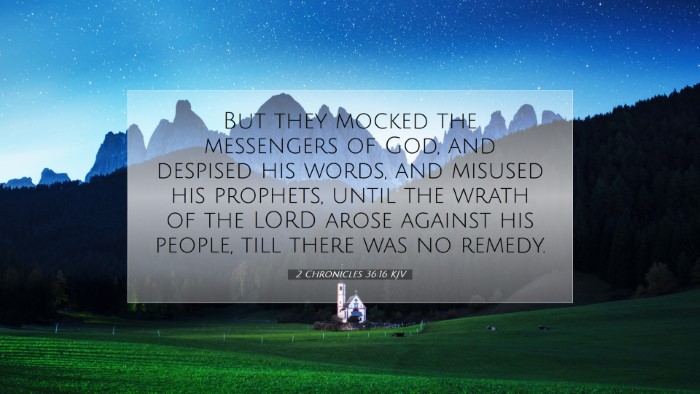Commentary on 2 Chronicles 36:16
Scripture: 2 Chronicles 36:16 - "But they mocked the messengers of God and despised his words, and misused his prophets, until the wrath of the LORD arose against his people, till there was no remedy."
Introduction
This verse encapsulates the tragic history of God's people, illustrating the consequences of persistent disobedience and the rejection of divine guidance. The insights drawn from public domain commentaries provide a deeper understanding of how the actions of the Israelites resulted in dire repercussions.
Overview of the Context
The final chapters of 2 Chronicles chronicle the decline of Judah, marked by a series of kings who led the nation away from God, culminating in the Babylonian exile. This verse serves as a poignant reminder that divine patience has limits, and the people's continued rebellion made them deserving of judgment.
Summary of Insights
- Mocking the Messengers of God: The term "mocked" indicates a blatant disrespect for God's representatives, reflecting a heart hardened against truth. Matthew Henry emphasizes that mocking the messengers is indicative of a broader rejection of God’s influence.
- Despising God's Words: Albert Barnes notes that to despise God’s word is to consider it unworthy of attention. This action leads not only to personal consequences but also negatively impacts the community, a theme prevalent throughout biblical history.
- Misusing the Prophets: Adam Clarke elaborates on the idea that the people actively sought to undermine the prophets' authority. Misuse can include physical harm or silencing their messages, demonstrating the extent to which the Israelites strayed from God’s purposes.
- The Wrath of the Lord: This verse highlights the divine response to human actions. Henry articulates that God’s wrath is a justified reaction to unrepentant sin, serving as a cautionary tale for future generations, emphasizing that neglect of divine counsel has severe repercussions.
- Until There Was No Remedy: Both Henry and Barnes discuss the finality of God’s judgment in this phrase. The window for repentance closed, indicating that the people's persistent rebellion led to a point of no return, thus underscoring the seriousness of their actions.
Detailed Analysis
The multifaceted nature of this verse deserves deeper exploration:
The Role of God’s Messengers
God sent messengers to warn and guide His people; however, their response was one of mockery. This rejection reflects a broader spiritual malaise, one that persists today. Henry emphasizes the significance of recognizing God's voice through His prophets, suggesting that such rejection leads to spiritual desolation.
Consequences of Despising Divine Instruction
Destruction often follows the disregard of God's word. Barnes indicates that the despising of divine instruction is often accompanied by increasing sin, ultimately leading to societal collapse. This underscores the importance of heeding God’s messages in personal and communal life.
Misuse and Its Implications
Clarke observes that the misuse of prophets often extended beyond simple rejection; it included acts of violence and persecution. This serves as a warning to contemporary believers about the dangers of silencing those who speak divine truth, leading to a culture void of God’s guidance.
Divine Wrath and Human Accountability
The expression of God's wrath is a pivotal theme in this verse. Henry articulates that anger arises not out of caprice, but as a necessary consequence of justice. This illustrates God’s righteousness and the seriousness with which He treats sin. Understanding God's wrath requires recognizing His holiness and the need for repentance to restore fellowship.
The Finality of Judgment
The phrase "until there was no remedy" serves as a sober reality check. It implies a definitive end to the opportunities for grace and repentance. As emphasized by both Henry and Barnes, this moment is a tragic climax resulting from a long history of refusal to adhere to divine correction.
It serves as a powerful lesson about the importance of timely repentance and the dangers of continual rebuff against God’s call.
Theological Implications
This verse challenges theological concepts of free will, judgment, and grace:
- Human Responsibility: The actions of the people highlight humanity’s responsibility in the relationship with God. Their choices led to dire outcomes, demonstrating that sin carries weighty consequences.
- The Nature of God’s Patience: The passage illustrates God's patience, but also His justice. While He desires to forgive, there comes a point where continued rebellion leads to inevitable judgment.
- The Necessity of Prophetic Voices: The ongoing need for individuals to speak truth today is essential. Silence in the face of error can lead society astray, emphasizing the call for modern prophets to arise and speak against cultural norms that defy God’s commandments.
Conclusion
This commentary on 2 Chronicles 36:16 serves as both a historical account and a timeless principle for all followers of Christ. As pastors, students, and theologians reflect upon this passage, the call is clear: heed the messages of God, embrace His words, and recognize that straying away from divine instruction leads to brokenness and judgment.
The narratives within the biblical text provide profound insights into the consequences of communal and individual disobedience against the backdrop of God’s enduring justice and mercy.


